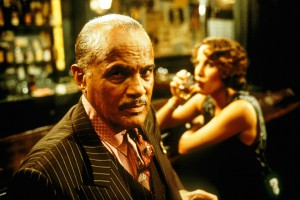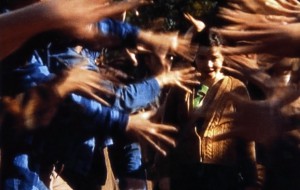From the Chicago Reader (July 23, 1996). Jazz fans who might be considering whether to watch this feature should hunt down instead Altman’s Jazz ’34, made at the same time in the same location and infinitely better. — J.R.

The sets — designed by Stephen Altman — are great, and so is the 30s jazz, but the story of this Robert Altman memory piece about his hometown, written with Frank Barhydt (Short Cuts), is borderline terrible. It counts on the dubious premise that a gangster (Harry Belafonte) would fritter away a whole night deciding what to do with a thief who rips him off — thereby enabling the thief’s significant other (Jennifer Jason Leigh) to kidnap a society lady (Miranda Richardson) and Altman to crosscut to his heart’s content as he exposes the inner workings of a city on the eve of a local election. The conception of character is so limited that the kidnapper’s seems to consist exclusively of Jean Harlow imitations, while the kidnappee’s seems defined only by drug addiction. Charlie Parker and his mother are gratuitously shoehorned into the plot, though some of the movie’s other strategies for imparting period flavor work better. The flip cynicism, which by now has become Altman’s trademark, doesn’t work at all. Read more
From the April 1, 2002 Chicago Reader. — J.R.

Disgusting yet interesting, Lars von Trier’s much heralded musical (2000) — or, more precisely, feature-length music video with interspersed dialogue — deserves to be seen because it’s a freakish provocation, not just because it won the Palme d’Or at Cannes. A Czech immigrant working at a factory in rural Washington State in the early 60s (Icelandic pop star Bjork) is going blind and knows her son will too if she can’t save enough money for an operation; the story gets even more melodramatic once a murder trial takes over. Reportedly shot with 100 digital video cameras (very few of which manage to find a good angle), the film reprises the sadomasochistic celebration of female suffering in Breaking the Waves, and with it von Trier affirms his solidarity with America’s impoverished and downtrodden people (apparently a diversion from his career in Denmark as a porn producer). The musical numbers are a weird blend of rock video and Jacques Demy postmusicals, with lousy songs and choreography and a distance between the music and the action that suggests an amateur remake of Pennies From Heaven. But in spite of everything, Bjork’s absolute dedication and submission to the material periodically blew me away. Read more


